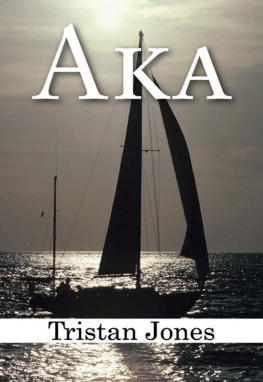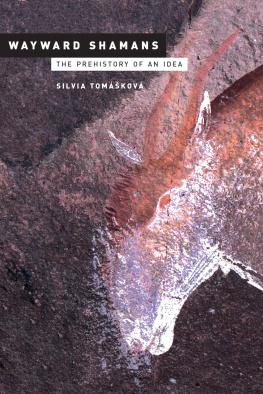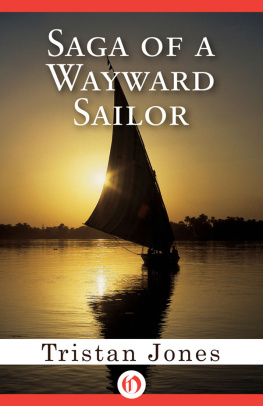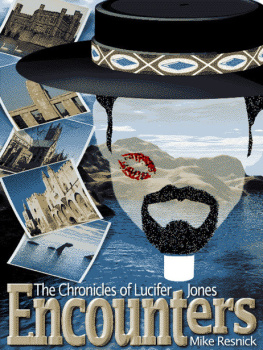Foreword
Every reader cherishes a fantasy of meeting a beloved author. Few ever realize this dream except, perhaps, to shake the author's hand at a rushed and crowded bookstore autograph session. Yet, even such ephemeral encounters are forever replayed in our mind's eye as we lovingly recall the pressure of the hand, the smile of appreciation, the inflection of the voice, the two or three words uttered by our idol's lips, directed exclusively at us and no one else. We gaze and gaze and gaze at the inscription as if it were on the verge of quickening.
Imagine, then, what it must feel like to write a fan letter to an author and have him contact you to tell you he would like you to become his literary agent. But in fact, that is precisely how I came to represent Tristan Jones.
It happens that when I was younger I developed a passionate but totally incomprehensible love for books about the sea. I say incomprehensible because my only relationship to oceans has been to bathe in them. I have never taken an ocean voyage, am a lousy swimmer, have spent a total of two hours in sailboats, and my only attempt to learn sailing ended in a preposterous debacle when I snagged the keelboard of a rented Sunfish on the rope perimeter of a kiddie swim area in St. Thomas, capsized, and had to be rescued before a crowd of hundreds including my young son who up to that point considered me his hero.
Yet the lure of the sea, however vicariously satisfied in books, has held an immense power for me. I've read countless novels and true accounts of men locked in mortal combat against this most formidable of elements, and as a result of this obsession I daresay I can speak as knowledgeably about ships and sailing as any landbound man alive. Put me on the bridge of a British ship of the line and I know I could gain the wind over that clumsy tub of a galleon and blast her to the bottom of the Bay of Biscay.
It was this passion that led me to purchase Tristan Jones's original trilogy of seagoing adventures, Saga of a Wayward Sailor, Ice!, and The Incredible Voyage. And it was the experience of immersing myself in his astonishing adventures, narrated in his ravishing and lilting prose, that caused me to write him a fan letter, in care of his publisher. You must understand that fan letters written by literary agents are not always as pure-hearted as billets-doux penned by the garden variety of enamored readers. After expressing intense admiration, such letters often end with a delicately worded expression of curiosity as to whether the author isahemrepresented by an agent. It is a matter of great pride for me that my letter included no such solicitation. (All right, it was written on my company letterhead.)
A few days later my secretary announced that Tristan Jones was on the phone. I wondered from what exotic locale this ship-to-shore communication came. The caller identified his position as a pay phone at latitude Seventh Avenue, longitude 8th Street, in Greenwich Village on the sun-drenched isle of Manhattan. My hero was a fifteen minute taxi ride from my office! By the end of that fifteenth minute, he was sitting across my desk from me. He told me that after selling his trilogy to Andrews McMeel Publishers without benefit of representation, he had engaged a literary agent to handle subsequent books. But he was no longer satisfied and had decided to seek a new one. My letter had arrived at just the right time, and of course, how could he not be represented by an agent who appreciated him so completely? We shook hands, and my fifteen year voyage with Tristan Jones was launched. Naturally, as with the launching of any other vessel, a bottle of spirits was broken to celebrate, not over a boat's hull, but rather over two glasses at a bar around the corner from my office.
Limitations of space prevent me from describing in detail our relationship over the ensuing years. If you want to know what Tristan did during that span of time, you need only to read the accounts of his adventures that he published, many of which are or will presently be available in Sheridan House editions.
The volume you hold in your hands is a wide- and free-ranging account of Tristan's encounters with denizens both of the deep and of the earth's surface. He makes no bones about which species he respects more. All of his observations are infused with the patented Jones irony, the mordant wit of a survivor who long ago used up his government issue of lifetimes.
It was during my tenure as his agent that Tristan underwent the amputation of first one leg and then the other as a result of the slow deterioration of his limbs due to World War II injuries. I knew him to feel sorry for himself only once, after the first amputation. That emotion lasted only a few weeks before he concluded that self-pity was a stupid emotion, and his energy would be far better spent planning new voyages, mobilizing and motivating crews, and directing his literary agent to find the wherewithal to make it all happen.
It was my privilege to find the wherewithal to help finance some challenges that would daunt, and indeed had daunted, men possessed of two legs, including the conquest of a river that had never been navigated before, on a boat manned by a crew of handicapped youth. Those who scoffed at this mad scheme had mistakenly gazed at the stumps of Tristan's legs. They should have looked into his heart of oak, his will of carborundum steel, his irresistibly charming grin, and his resourceful mind of a million brilliant facets.
Tristan's correspondence with me over the course of our association is characterized by constant worry about money, by visions of new and improbable ventures, and by complaints: complaints about publishers, complaints about creditors, complaints about governments, complaints about everything and everybody including me. He was wise enough to complain only about things he could do something about, and to be stoical about those beyond his control. All of the former were eventually resolved, while the latter dissipated like storm clouds before Tristan's good-humored resignation. But there was one sorrow to which he never became reconciled: the failure of the world to recognize him in his time. It ate at his heart like a lamprey.
It ate at mine, too, and does to this day I spent a great deal of time seeking ways to publicize Tristan's accomplishments in the media. But though he was (and still is) a legend in every port of call around the globe, honored by his peers of the Explorers Club, and celebrated by all who ply the seas in small crafts, the glory he deserves has never been accorded to him. It is nothing short of tragic that Tristan Jones, whose spirit is one with the likes of Burton, Speke, and Gordon, should not occupy a niche beside those immortals in the pantheon of human valor.












